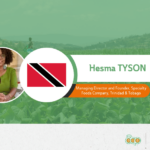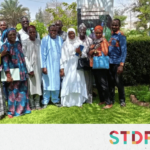CAMEROON: MORE COORDINATION FOR GREATER IMPACT
- 04/04/2018
- Posted by: Gaetan Dermien
- Category: Uncategorized
COLEACP and the European Development Fund National Authorizing Officer Support Unit (CAON-FED) signed a partnership agreement on 22 March to share their knowledge and experience with a view to heightening capacity building in the public and private horticultural sector in Cameroon.
The principle objectives of this partnership are to:
- Promote the horticultural sector as a driver for macro-economic growth through job creation for the younger generation by ensuring that agriculture is more productive, competitive and relevant to national, regional and international markets;
- Attract investment to the most promising horticultural value chains to ensure that the necessary resources are available to contribute to the success of the national horticultural strategy.
CAON-FED is the structure responsible for acting as an interface and facilitator between the Cameroon Government and the Delegation of the European Union.
On 4 and 5 April, both organisations held a workshop on the respective roles and responsibilities of public and private sector stakeholders for sanitary and phytosanitary controls systems, using the Cameroon fruit and vegetable export sector as an example.
Several Togolese Ministers and the Togo National Sanitary and Phytosanitary Committee have signed a partnership agreement with the Standards and Trade Development Facility (STDF) to provide capacity building on the application of sanitary and phytosanitary measures in Togo. This partnership should help to provide better market access for Togolese fruit and vegetables, and more broadly lead to sustained economic growth and poverty alleviation for the country.
This project supplements the initiatives undertaken by other United Nations bodies, such as the FAO and the WHO (National communications strategy on sanitary and phytosanitary issues, Food inspection good practices guide).
Food safety (Maximum Residue Limits of pesticides exceedances) and plant health (white flies, fruit flies and false codling moths) issues encountered in the horticultural industry will be targeted. It is foreseen for COLEACP to support the implementation of this project and to leverage the experiences from the horticultural industry to positively impact other Togolese agricultural value chains.
The expected outcomes are an improved sanitary and phytosanitary control system and more effective traceability for Togolese fruit and vegetable exports.



![EU and GB MRL changes in 2025 (January-March 2025) 9-FFM+-[ENG]](https://news.colead.link/wp-content/uploads/2024/06/9-FFM-ENG-150x150.jpg)
